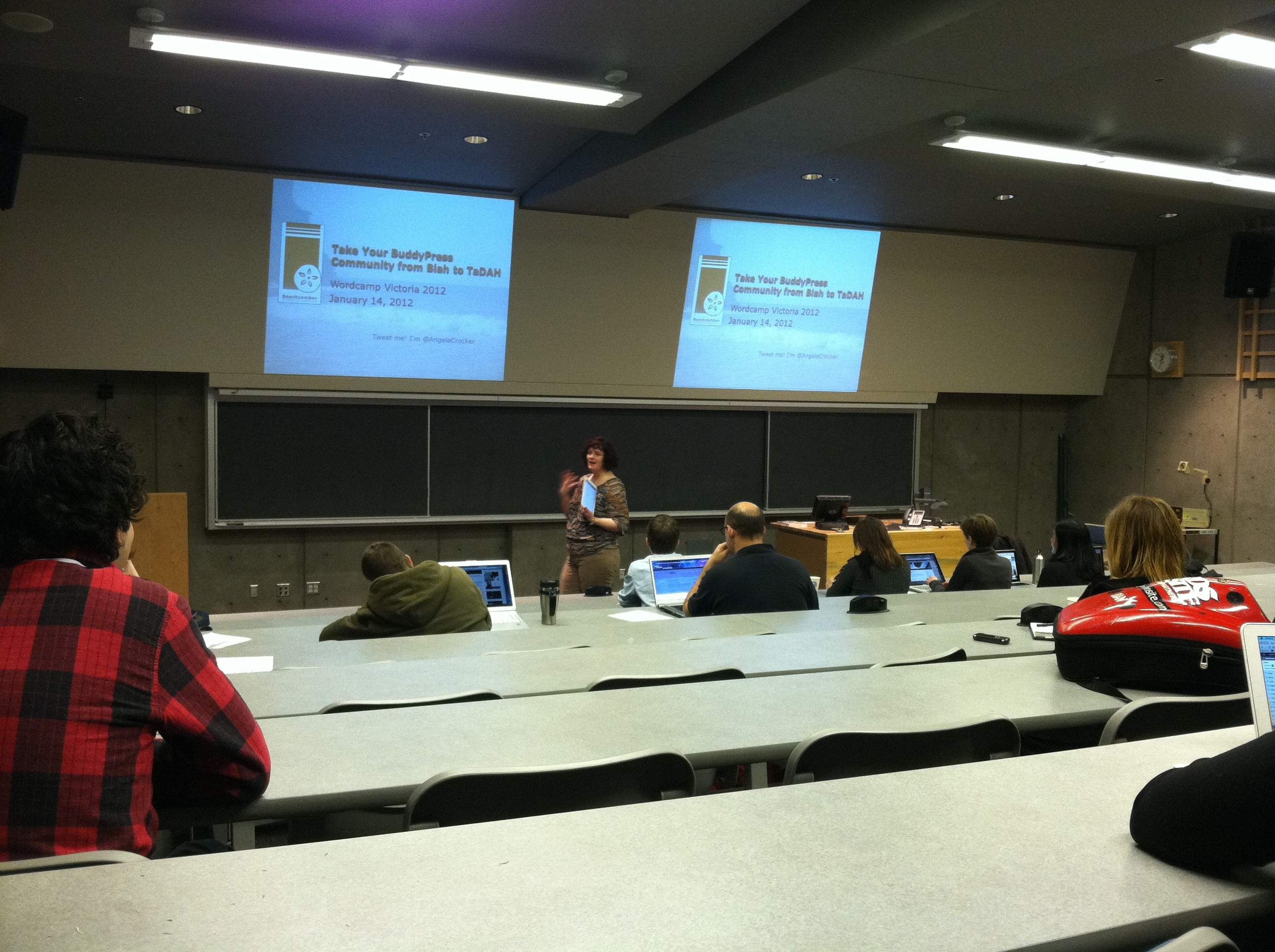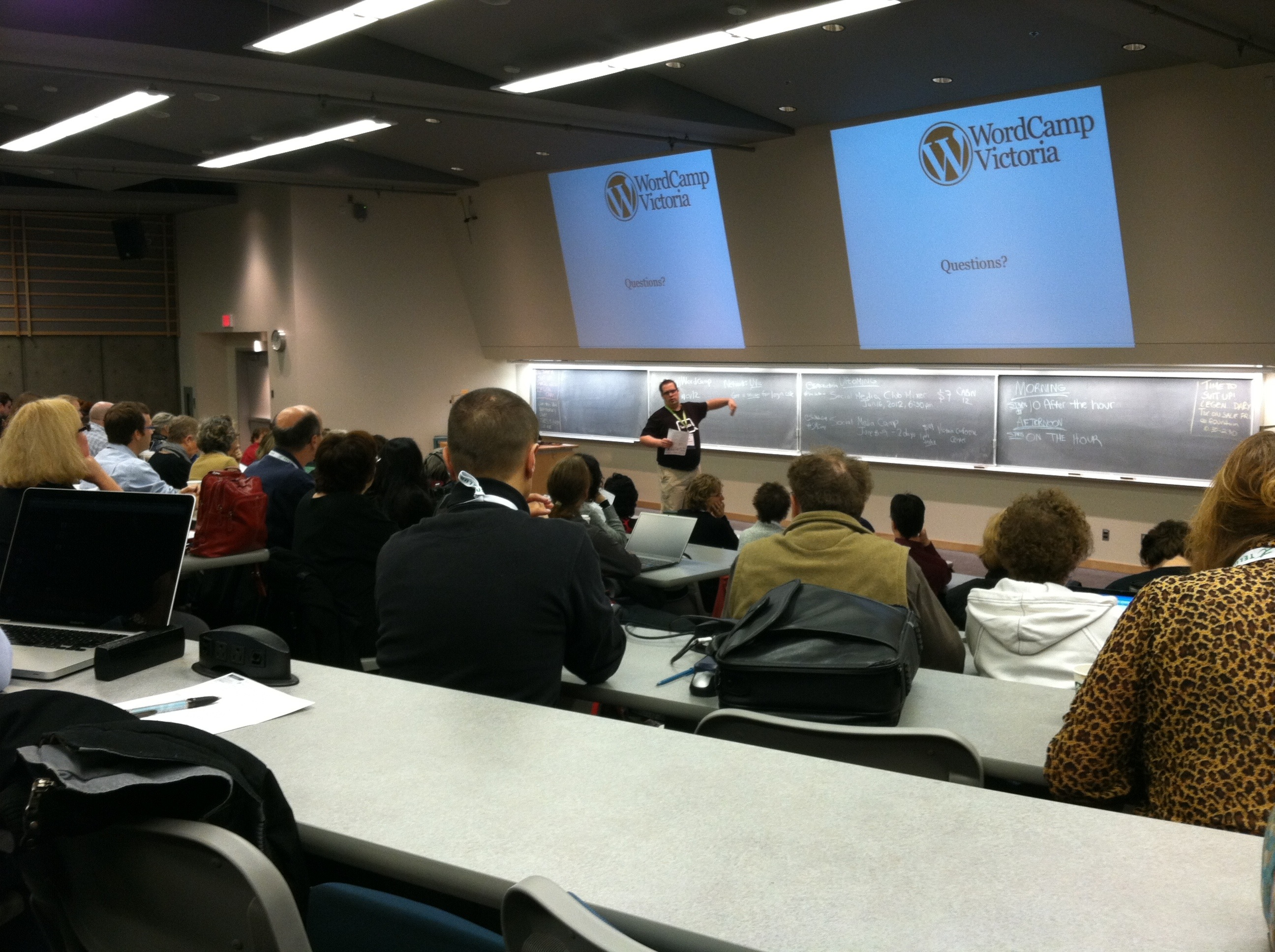Tag: WordPress
Open Web FTW
The Internet needs a strong, independent platform for those of us who don’t want to be at the mercy of someone else’s domain. I like to think that if we didn’t create WordPress something else that looks a lot like it would exist. I think Open Source is kind of like our Bill of Rights. It’s our Constitution. If we’re not true to that, nothing else matters.
Matt Mullenweg – Open Web FTW. (via Daniel)
From the workshop: Don’t steal my Theme Options. Great writeup on theme options in Duet by Andy at the Theme Foundry. When you put this much thought and care into the settings of your product you are going to create a wonderful product.
When Did You Last Blog? A Fresh Start. Nacin did it! Explains the pigs flying outside my window this morning. 😉
Scaling my long-form writing
Earlier Daniel asked me about starting a blog circle of sorts to help each other work on longer form writing that requires research, editing, and more careful thought. I think it’s a great idea. There’s a few things that I’d love to explore in more depth here that I don’t have a good structure in place for right now.
A benefit to attending a liberal arts school like Whitman was the sheer amount of writing I did every semester. Many classes required 4 papers a semester each of 5-7 pages. It meant I was writing something almost every week.
Since graduating the frequency of writing I’ve done has gone up drastically. Whether it’s on this blog or in my work at Automattic I’m writing far more and in far more varied contexts than I ever have before. That’s fun. What I’m not doing is the type of sustained, long-form writing that causes me to dig deeper and push my abilities. That’s also fun but is more difficult to do on a blog than as part of coursework.
There’s a few ideas that have been kicking around in my head that may fit for getting back into the swing of things with research and in-depth writing.
First, I’ve been thinking more about how news organizations need to think of themselves as crafting a product. It’s something I’ve written about before and is something I’d love to dive more deeply into. There could be an interesting line to trace here between the history of news publications and the growth of technology companies that more readily grok what it means to create a product.
Second, it’d be great to spend more time researching how WordPress can play a role in a rebooted school system. I think our current system of schooling is on its way out. Something may take its place and I think WordPress can, and in many cases probably is, playing a role here. Collecting those stories and theorizing a bit about what a more sustainable school system could look like would be fun.
We’ll see how this goes. It’d be a blast to get back into writing pieces longer than 500 words.
Lessons from new user workshops
At August’s WordCamp San Francisco I helped organize and run a new user workshop on the Friday and Saturday of the 3-day conference. The next month I did the same thing for Portland’s WordCamp. There’s a lot that we can learn as creators of software by doing events like these. I think we need to do more of them.
New user workshops teach us so much about how users actually approach software. There’s not a more honest way to know how difficult or easy your software is to use than to try and walk a roomful of people through how to use it.
With a maturing project like WordPress this becomes even more true. It’s at a point where it can do so much that it is overwhelming to many people. They don’t know where to start. Somebody with no prior experience using your software is remarkably effective at finding the areas that are not easily understood. They are not shy about telling you what’s broken.
These workshops taught me that things need to be simpler. There are so many options to click on after loading the Dashboard. It’s too much. The first Dashboard load in these workshops was greeted, in many cases, with a look of overwhelmed confusion. Many people were lost and they hadn’t even started.
One thing that held true through the workshops was that the easiest features to explain were those most closely aligned to concrete actions on the site. Screens like the discussion settings and custom menus were almost impossible to comprehend. Others, like the Typekit font preview on WordPress.com, were immediately grokked and loved. Too many things in the Dashboard are abstracted from what they actually do on a site. Publishing shouldn’t be done in a control panel.
By gathering dozens of new users into one place you can also learn how people use software on various devices. We had people at the workshops using everything from a netbook, to MacBook Pros, iPads, and more. It was actually amazing how much of the workshop people could follow on nothing more than an iPad and an external keyboard.
Not only can we learn about the strengths and weaknesses of software, but we also learn how invigorating it is to have people using the tool we work on. At Automattic, I spend all of my day working on user support. Helping people publish on the web is what I do. To that end these workshops were refreshing. I had the opportunity to help everyone. From eleven-years old to a seventy they all walked away with a great looking blog.
I’m cleaning up the outline we used for each workshop into a curriculum of sorts that could be used by anyone to run their own new user workshop. The more events like these we can hold the better WordPress will become.
Status
Just when I think I’ve wrapped up the changes to my site I realize that there’s a half dozen CSS and content changes still left. It’s a process.
Improve software by using it
Daniel recently moved his site to WordPress.com and had this to say in the comments of his announcement post:
I want WP.com to be good enough that I can sincerely recommend it to my friends and family, but in some cases WP.org has better features, flexibility, etc. There’s still work to be done; actually using our software is the best way to discover what needs to be done.
This is why every developer of a publishing tool must be a consistent and active user of the software. The best way to learn how to improve something is by using it regularly.
My site will be moving back over there hopefully next week. I just need to carve out an hour or two to customize a theme a bit and get all the content moved over properly.
Status
I’m speaking tonight at the WordPress D.C. meetup which will be a lot of fun. The long title for my talk is, “Post formats: how they work, why they’re awesome, and how they’ll change the way you publish.” I’ll probably turn it into a blog post after the event as well.

